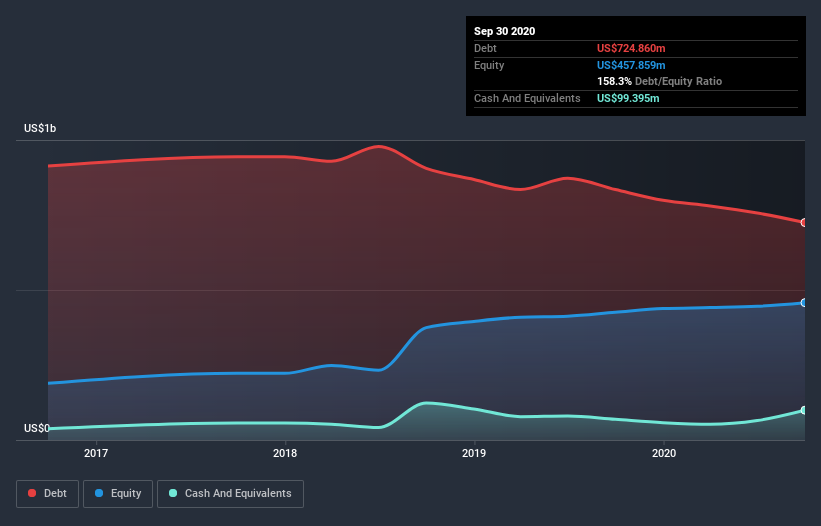
The external fund manager backed by Berkshire Hathaway's Charlie Munger, Li Lu, makes no bones about it when he says 'The biggest investment risk is not the volatility of prices, but whether you will suffer a permanent loss of capital.' It's only natural to consider a company's balance sheet when you examine how risky it is, since debt is often involved when a business collapses. As with many other companies Mesa Air Group, Inc. (NASDAQ:MESA) makes use of debt. But the more important question is: how much risk is that debt creating?
What Risk Does Debt Bring?
Debt and other liabilities become risky for a business when it cannot easily fulfill those obligations, either with free cash flow or by raising capital at an attractive price. Ultimately, if the company can't fulfill its legal obligations to repay debt, shareholders could walk away with nothing. However, a more frequent (but still costly) occurrence is where a company must issue shares at bargain-basement prices, permanently diluting shareholders, just to shore up its balance sheet. Of course, the upside of debt is that it often represents cheap capital, especially when it replaces dilution in a company with the ability to reinvest at high rates of return. The first step when considering a company's debt levels is to consider its cash and debt together.
View our latest analysis for Mesa Air Group
What Is Mesa Air Group's Net Debt?
As you can see below, Mesa Air Group had US$724.9m of debt at September 2020, down from US$834.8m a year prior. However, because it has a cash reserve of US$99.4m, its net debt is less, at about US$625.5m.

A Look At Mesa Air Group's Liabilities
According to the last reported balance sheet, Mesa Air Group had liabilities of US$353.3m due within 12 months, and liabilities of US$690.7m due beyond 12 months. Offsetting these obligations, it had cash of US$99.4m as well as receivables valued at US$13.7m due within 12 months. So its liabilities total US$931.0m more than the combination of its cash and short-term receivables.
This deficit casts a shadow over the US$235.6m company, like a colossus towering over mere mortals. So we'd watch its balance sheet closely, without a doubt. After all, Mesa Air Group would likely require a major re-capitalisation if it had to pay its creditors today. There's no doubt that we learn most about debt from the balance sheet. But ultimately the future profitability of the business will decide if Mesa Air Group can strengthen its balance sheet over time. So if you're focused on the future you can check out this free report showing analyst profit forecasts.
In the last year Mesa Air Group had a loss before interest and tax, and actually shrunk its revenue by 25%, to US$545m. That makes us nervous, to say the least.
Caveat Emptor
Not only did Mesa Air Group's revenue slip over the last twelve months, but it also produced negative earnings before interest and tax (EBIT). Indeed, it lost US$3.7m at the EBIT level. If you consider the significant liabilities mentioned above, we are extremely wary of this investment. Of course, it may be able to improve its situation with a bit of luck and good execution. However, we note that trailing twelve month EBIT is worse than the free cash flow of US$148m and the profit of US$27m. So there is arguably potential that the company is going to turn things around. The balance sheet is clearly the area to focus on when you are analysing debt. But ultimately, every company can contain risks that exist outside of the balance sheet. Case in point: We've spotted 4 warning signs for Mesa Air Group you should be aware of.
If, after all that, you're more interested in a fast growing company with a rock-solid balance sheet, then check out our list of net cash growth stocks without delay.
If you decide to trade Mesa Air Group, use the lowest-cost* platform that is rated #1 Overall by Barron’s, Interactive Brokers. Trade stocks, options, futures, forex, bonds and funds on 135 markets, all from a single integrated account. Promoted
New: Manage All Your Stock Portfolios in One Place
We've created the ultimate portfolio companion for stock investors, and it's free.
• Connect an unlimited number of Portfolios and see your total in one currency
• Be alerted to new Warning Signs or Risks via email or mobile
• Track the Fair Value of your stocks
This article by Simply Wall St is general in nature. It does not constitute a recommendation to buy or sell any stock, and does not take account of your objectives, or your financial situation. We aim to bring you long-term focused analysis driven by fundamental data. Note that our analysis may not factor in the latest price-sensitive company announcements or qualitative material. Simply Wall St has no position in any stocks mentioned.
*Interactive Brokers Rated Lowest Cost Broker by StockBrokers.com Annual Online Review 2020
Have feedback on this article? Concerned about the content? Get in touch with us directly. Alternatively, email editorial-team (at) simplywallst.com.
About NasdaqCM:MESA
Low and slightly overvalued.
Similar Companies
Market Insights
Community Narratives



